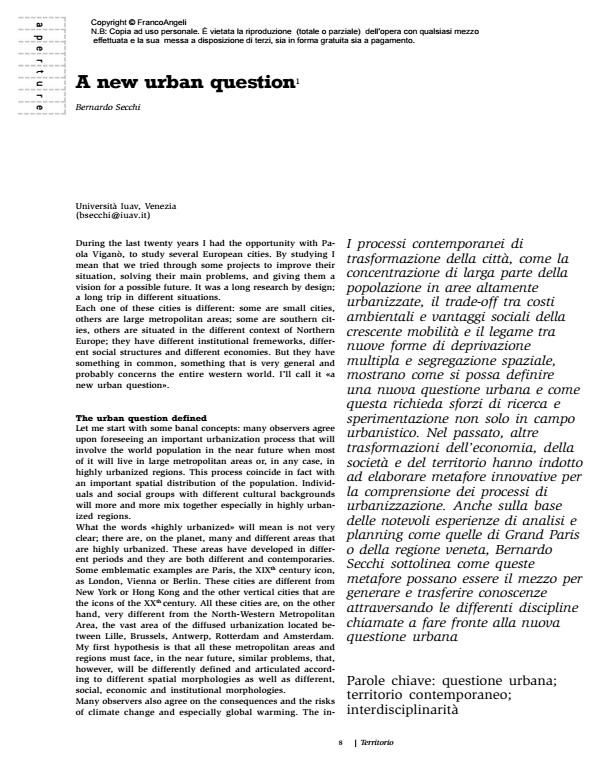A new urban question
Titolo Rivista TERRITORIO
Autori/Curatori Bernardo Secchi
Anno di pubblicazione 2010 Fascicolo 2010/53 Lingua Inglese
Numero pagine 11 P. 8-18 Dimensione file 2992 KB
DOI 10.3280/TR2010-053002
Il DOI è il codice a barre della proprietà intellettuale: per saperne di più
clicca qui
Qui sotto puoi vedere in anteprima la prima pagina di questo articolo.
Se questo articolo ti interessa, lo puoi acquistare (e scaricare in formato pdf) seguendo le facili indicazioni per acquistare il download credit. Acquista Download Credits per scaricare questo Articolo in formato PDF

FrancoAngeli è membro della Publishers International Linking Association, Inc (PILA)associazione indipendente e non profit per facilitare (attraverso i servizi tecnologici implementati da CrossRef.org) l’accesso degli studiosi ai contenuti digitali nelle pubblicazioni professionali e scientifiche
Contemporary processes of urban transformation like the concentration of a large part of the population in highly urbanised areas, the trade-off between environmental costs and the social advantages of increased mobility and the connection between new forms of multiple deprivation and spatial segregation, show how the new urban question may be defined and how this requires research efforts and experimentation not just in the field of urban planning alone. In the past other changes in the economy, society and the environment have led to the formulation of innovative metaphors for the comprehension of urbanisation processes. With his considerable experience which includes planning analyses such as that of Grand Paris and the Veneta Region, Bernardo Secchi underlines how these metaphors can be used as a means to generate and transfer knowledge across the disciplines called upon to address the new urban question.
Keywords:Urban question; contemporary city; interdisciplinarity.
- Innovation in Urban and Regional Planning Luca Barbarossa, pp.94 (ISBN:978-3-030-96984-4)
- City and Ageing: Milan Explorations of the daily life of the elderly in a teaching experience Agim Kërçuku, Gennaro Postiglione, Jiarui Cui, Giovanni Hanninen, in TERRITORIO 104/2024 pp.164
DOI: 10.3280/TR2023-104020 - Multiscalarità. Dimensioni e spazi della contemporaneità1 Michelangelo Russo, in ARCHIVIO DI STUDI URBANI E REGIONALI 113/2015 pp.5
DOI: 10.3280/ASUR2015-113001 - At the Crossroads between Urban Planning and Urban Design: Critical Lessons from Three Italian Case Studies Pier Carlo Palermo, Davide Ponzini, in Planning Theory & Practice /2012 pp.445
DOI: 10.1080/14649357.2012.701661 - Exploring the functional area approach in EU urban strategies Carlotta Fioretti, Martina Pertoldi, in Transactions of the Association of European Schools of Planning /2020 pp.146
DOI: 10.24306/TrAESOP.2020.02.006 - Understanding Mobilities for Designing Contemporary Cities Gabriele Pasqui, pp.49 (ISBN:978-3-319-22577-7)
- From Contention to Co‐governance: The Case of the Right to Inhabit Movement in Rome (2000–2013) Alejandro Sehtman, in Antipode /2018 pp.456
DOI: 10.1111/anti.12283 - Dibattito Bertrando Bonfantini, Roberto Camagni, Francesco Chiodelli, Augusto Cusinato, Laura Fregolent, Ezio Micelli, Stefano Moroni, Alberto Roccella, Michelangelo Savino, in ARCHIVIO DI STUDI URBANI E REGIONALI 114/2015 pp.161
DOI: 10.3280/ASUR2015-114008 - How the EU regional policy can shape urban change in Southern Europe: learning from different planning processes in Palermo Ignazio Vinci, in Urban Research & Practice /2021 pp.445
DOI: 10.1080/17535069.2019.1672083 - Spatial Tensions in Urban Design Agim Kërçuku, pp.189 (ISBN:978-3-030-84082-2)
- Shaping Regional Futures Carlo Pisano, Veronica Saddi, pp.173 (ISBN:978-3-030-23572-7)
- New Metropolitan Perspectives Carmela Mariano, Marsia Marino, pp.2692 (ISBN:978-3-031-06824-9)
Bernardo Secchi, A new urban question in "TERRITORIO" 53/2010, pp 8-18, DOI: 10.3280/TR2010-053002